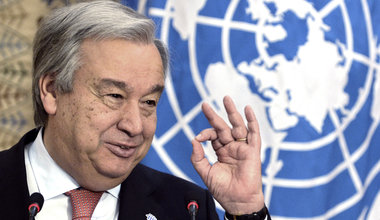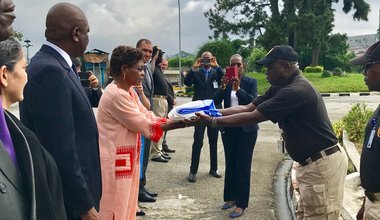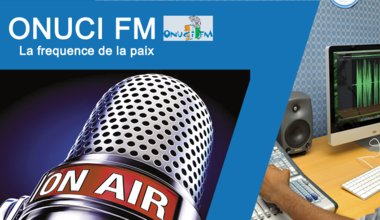PRESS REVIEW FOR TUESDAY, 24 MAY 2011
UNOCI Chief
discusses Ivorian economic situation with the IMF's delegation
Le Mandat
–
The Special Representative of the United Nations Secretary-General for Côte
d'Ivoire, Y. J. Choi and a delegation of the International Monetary Fund (IMF)
on Monday, 23 May discussed the Ivorian economic situation after the
post-electoral crisis. After the meeting the Chief of the IMF mission in Côte
d'Ivoire, Doris Ross, underlined the need to overcome the blockage in the
Ivorian economy. In this regard the Chief of delegation gave the priorities the
institution will tackle first. "Resolving the crisis is the major challenge in
terms of economic activities", she explained. (...)
Ban Ki-Moon
(UN SG): "The United Nations' work is not over at all"
Nord Sud
–
Having arrived in Côte d'Ivoire on Saturday 21 May 2011 to take part in the
investiture ceremony for President Alassane Ouattara in Yamoussoukro, the UN
Secretary-General, Ban Ki-Moon, gave an interview to ONUCI FM. He here explains
the reason for his presence and talks about the coming challenges as well as the
future role of UNOCI.
ONUCI FM:
Excellency, Mr. Secretary-General of the United Nations, Ban Ki-Moon, you
attended the investiture ceremony for President Alassane Ouattara. You travelled
to attend the ceremony. Why did you decided to do so?
SG Ban Ki-Moon:
This was a historical day not only for Côte d'Ivoire but also for the African
continent. I was very moved by the ceremony, by his statement: promoting
national reconciliation, reestablishing peace and stability (...)
ONUCI FM:
The United Nations supported the results of the elections here in Côte d'Ivoire
in spite of the difficulties and criticism from some African intellectuals.
Would you do it again if need be?
SG Ban Ki-Moon:
The UN mandate in Côte d'Ivoire is clear. The mandate has been given by the
Security Council and includes the certification of the elections. (...) The UN
took a position of principle in order that the will of the Ivorian people is
respected. (...) Several countries and organizations including the ECOWAS and the
African Union worked together during the last months to ensure that our common
values are respected.
ONUCI FM:
And what will be the UN mandate in Côte d'Ivoire now that Alassane Ouattara has
been acknowledged and inaugurated?
SG Ban
Ki-Moon:
The United Nations' work is far from over. The electoral crisis exacerbated and
increased the already existing challenges and created new difficulties. It is
essential that President Ouattara has all the assistance he and his government
need. (...) The mission has already collaborated with the Government to instill
the democratic principles in the country, favour national reconciliation and
respond to human rights violations and the humanitarian crisis. (...)
Human rights:
The investigation commission delivers its conclusions in June
Fraternité
Matin –
The International Human Rights Investigation Commission set up by
the United Nations to investigate on the post-electoral violence will deliver
its conclusions next month. (...) Having arrived in Côte d'Ivoire some four weeks
ago, the Commission visited several regions in the country, especially the west
where several organizations for the defence of human rights and UNOCI registered
hundreds of deaths in March. Their mission is to identify the authors of human
rights violations and prosecute them. (...) The International Investigation
Commission, which is composed of independent personalities, is expected to
deliver its report to the UN Human Rights Council. [...]
Joining the
government: The FPI takes a decision on Wednesday - A central Committee is
convened
Soir Info –The
FPI will meet on Wednesday through a central committee to make a decision among
other issues on the urgent issue of the FPI joining or not the government
Alassane Ouattara is about to form. (...) The meeting will mobilize all the
leaders who are free. (...) The central committee would examine the news: From the
situation of the leaders under house arrest or exiled to the security issue and
the problem of joining or not the government.
(...)
President
Alassane Ouattara on RFI and France 24: « Gbagbo will be tried by the CPI)
Le Patriote –
(...)
Question:
You were inaugurated on Saturday with a big mobilization of Ivorians after some
18 years of fight. How do you feel?
Alassane
Ouattara:
The mobilization of Ivorians really impressed me. I think it is a
very strong sign. Côte d'Ivoire is uniting in spite of the terrible
post-electoral crisis with 3000 deaths, many frictions and the Heads of State
honoured us. (...)
Q: When
the Licorne Force played a decisive role in the resolution of this
post-electoral crisis. How do you respond to those who say you have been
installed by foreign forces?
AO:
This
is because they merely do not know the reality. The Ivorians are proud to have
waged this war. Anyway it is not the Licorne or the UN force who allowed the
FRCI to come to Abidjan. (...)
Q: On
Saturday 9 April you are blocked in the Golf Hotel with heavy arms targeting
your hotel. On Sunday 10 April at 9 am you called Nicolas Sarkozy to tell him to
do something. Does friendship count in this case because you have been friends
for 15 years.
AO:
No, I called Nicolas Sarkozy but I also called Ban Ki-Moon. France just reacted
within the framework of its mandate. (...)
Q: On
Saturday Nicolas Sarkozy announced he will maintain a military headquarters in
Port-Bouet in Abidjan. It is a surprise? Did you ask him to do that?
AO:
Yes President Bédié and I asked the French authorities to maintain the military
headquarters.
(...)
Why withdraw the military headquarters from Côte d'Ivoire?
I think it is a
significant tool for the fight against terrorism.
(...)
Q: At the
inauguration ceremony, Mr. President, you talked about reconciliation; we did
not hear of forgiveness.
Can we
reconcile without forgiving?
AO:
Not at all!
We should reconcile in dialogue. (...) Positive justice also means
punishing the biggest crimes. (...)
Q:
Concerning Laurent Gbagbo who is still in Korhogo in the north of the country,
who will try him? Is it the international Criminal Court or the Ivorian court?
AO:
(...) bribery, destabilization, confiscation of power after election,
denunciations, etc can be tried by Ivorian courts. But we also have war crimes,
crimes against humanity, bloody crimes. We want the CPI to try them.
Q: Laurent
Gbagbo will therefore go to the CPI?
AO:
We will ask for Laurent Gbagbo to go on trial. I have already sent a letter to
ask for this. (...)
Q: Some
Heads of State you received on Saturday undoubtedly told you to give up.
AO:
No.
(...) What happened is too serious. Why should other Heads of State
be prosecuted by the CPI for their deeds (...) and Laurent Gbagbo should not!
Q: Do you
not fear that on the occasion of a trial in Abidjan, Laurent Gbagbo transforms
the trial into a political tribune?
AO:
You know I believe he has no real influence. He maintained people by terror and
money. (...) Anyway what I fear is an attempt of kidnapping or violence against
him.
(...)
Q: Mr.
President your men the FRCI have also committed atrocities in the west in
Duekoué. You said no crime will remain unpunished. Have these men been arrested?
AO:
We need to investigate first. We asked the regional prosecutor to carry out
investigations. I also asked the Human Rights Commission to conduct an
investigation. At the end of these investigations all the guilty persons will be
tried. (...)
 ONU
ONU Nations Unies Maintien de la paix
Nations Unies Maintien de la paix




